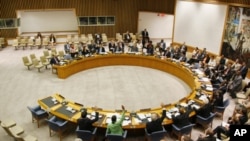It was a dramatic day for Libya at the United Nations. In the morning, the National Transitional Council, which now governs the country, was granted the Libyan seat in the General Assembly hall. In the afternoon, the U.N. Security Council unanimously adopted a resolution lifting some sanctions and easing others in an effort to help the North African nation as it moves into its new era.
The Security Council had imposed sanctions including asset freezes, an arms embargo and other measures on the government of Moammar Gadhafi in the spring, in a bid to stop his violent crackdown on anti-government protesters.
On Friday, the 15-member council lifted financial sanctions against some Libyan banks and companies and eased measures on others as it tries to help the interim government stabilize and rebuild the country. Germany’s U.N. Ambassador Peter Wittig said adoption of the resolution would help stimulate Libya’s economic recovery.
“By lifting and modifying the asset freeze, the local economy and trade will be kick-started," said Wittig. "However, this is a first step only. It is clear that eventually all economic sanctions shall be lifted for those entities under the control of the Libyan authorities.”
Support mission cleared
The Council also gave its authorization for a U.N. support mission of about 200 persons to deploy to Libya. British Ambassador Mark Lyall Grant explained some of what the mission will do.
“It establishes a U.N. Mission that will, among other things, provide support to Libyans in preparing for elections so that they can choose their own leaders; to assist institution building so they can provide services to their people; to help the promotion and protection of human rights; and to support steps towards economic recovery to ensure a prosperous and stable future for Libya,” said Grant.
But the resolution does not abolish the No Fly Zone over Libya, which was established to protect civilians from Gadhafi’s forces, that will continue for now. It does, though, allow the national airline to fly again. And it also eases an arms embargo to allow for the sale of weapons to Libya’s police and security forces, and for aid workers, media and security guards protecting U.N. staff to carry small weapons to protect themselves.
Revolutionary flag to fly
Libya’s deputy U.N. Ambassador Ibrahim Dabbashi defected early in the uprising. He returned to the Security Council Friday to take up his seat again as deputy representative.
He said that the name of Libya - known under Gadhafi’s government as the Socialist People’s Libyan Arab Jamahiriya - has been changed to its original name - Libya. And he said the red, black and green flag of the revolution would soon fly over the United Nations.
Ambassador Dabbashi said the unanimous adoption of Friday’s resolution showed the continuing support of the United Nations for Libya. He also said it is an important step toward returning stability to the country, and launching reconstruction and development efforts.
Earlier Friday, the U.N. General Assembly overwhelmingly approved the National Transitional Council’s request to take up Libya’s seat in the hall of nations, effectively recognizing the end of the 42-year long reign of Moammar Gadhafi.
Libya Has Historic Day at UN




